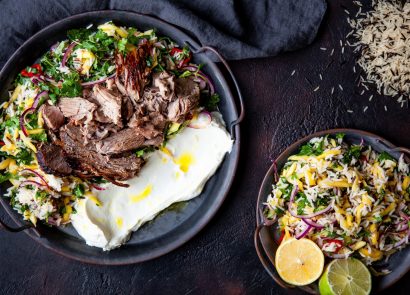Give winter bugs the boot with these immunity-boosting bites, says nutritionist Louise Pyne
We’re heading into sniffle season, and whether you’re on your daily commute to work, pounding the treadmill at the gym or just hanging out with friends – bugs are literally everywhere. It’s not all bad news though – changing up your diet is one of the best ways to sidestep sickness and stay happy and healthy all season long. Fuelling your body with the right nutrients will build up your body’s defence system to help offset pesky ailments like colds and flu. To get you started, check out these foods to effectively promote immunity for the cooler months ahead.
Blueberries
The importance of berries for overall wellbeing can’t be understated. These little purple powerhouses contain antioxidants called anthocyanins, which increase your body’s production of natural killer cells – these keep your immunity high and risk of illness, low. According to a study by researchers at Linus Pauling Institute, Oregon State University, blueberries also contain a compound called pterostilbene, which works in synergy with vitamin D. Together, this duo impacts the expression of a gene called CAMP, which is involved in boosting immune function. Add blueberries to smoothie bowls, overnight oats and fruit salads to gain their nutrients.
Ginger
Ginger is one of those warming winter spices we just can’t get enough of on cold, blustery days. Better still, this zingy ingredient is a proven immunity-booster thanks to its anti-inflammatory properties. The active ingredient is gingerols, an antioxidant which helps to ward off illness. Next time you start to feel under the weather, whip up a ginger shot to give your body a concentrated dose of nutrients – juice fresh ginger root, then add a squeeze of lemon and a spoonful of Manuka honey.
Pineapple
The smell of pineapple brings back memories of days spent in the sunshine, and research also shows that the fruit can turbocharge immunity. A study by the Women’s University School of Nutrition found that eating half a cup of pineapple every day for two months helped boost your defences.
Yoghurt
The health of your gut reflects the state of your immunity. Probiotics, the good bacteria found in foods like unflavoured yoghurt, help our guts run smoothly by making sure we have a higher ratio of beneficial bacteria to bad bacteria. Eat yoghurt with fruit as a snack or add a couple of tablespoons to smoothies to get your friendly bacteria fix.
Strawberries
With more vitamin C than oranges, this hero fruit is a powerful immunity booster, and they contain flavonoids which help to keep our skin clear. Add chopped strawberries to oats or homemade muesli to get a dose of this essential vitamin.
Pumpkin seeds
Zinc is one of the most important nutrients when it comes to super-charging immunity, and pumpkin seeds are full of this micronutrient. It’s thought that the mineral helps to fend off infection by lowering inflammation to cut the risk of illness. Interestingly, studies show that zinc helps to reduce the severity of the common cold and shorten its duration, so keep a bag of pumpkin seeds in your bag and start nibbling next time you feel the sniffles coming on.
Almonds
Whether you eat them raw or blitz almond milk into smoothies, these nuts are a good source of cold-fighting vitamin E, which protects your cells from free-radical damage that could weaken the outer layer that guards cells from foreign invaders. This vitamin also kickstarts your body’s immune response when it’s under attack, making it a must-eat.
How to protect your immune system
Try needlework
According to traditional Chinese medicine, a poor immune system is down to an imbalance in vital energy, otherwise known as qi. Acupuncture is believed to help restore the flow of qi in the body by freeing energy blockages.
Be more active
Keeping your immune system strong is just another reason to get off the sofa and into the gym. Exercise causes changes in antibodies and white blood cells, reducing inflammation that could cause illness.
Limit alcohol
Alcohol stops white blood cells from functioning efficiently, which means illness-causing bacteria can thrive, making it harder for your body to fight off illness. Stick to a couple of drinks per week – a small glass of red wine is a better choice over spirits as it contains antioxidants.
Start monitoring your sleep routine
Poor sleep suppresses your body’s ability to function to its full potential which dampens your immune response, making you more susceptible to bacteria and viruses. Aim to go to bed and wake up at roughly the same time each night.
Keep stress levels low
Minimising stress is as good for physical health as it is for mental wellbeing. Stress hampers the body’s immune system making it harder to fend off bugs. Set aside time for relaxation – sign up to a weekly yoga class or try regular meditation to keep stress in check.
Five ways to support your gut health
Bimuno dietitian and health writer Laura Tilt shares her tips
Your gut is home to 70 percent of your body’s immune cells, making a healthy gut central to a strong immune system. So, follow these five simple steps for good gut health.
1. Love fibre
Foods rich in fibre feed friendly bacteria in your gut. Top up your intake with fruits, vegetables, oats, whole-grains, seeds and pulses like chickpeas and beans.
2. Find your calm
Just like your brain, your gut is sensitive to stress, with studies showing that high stress levels can disrupt beneficial gut bacteria. Whether it’s meditation, reading or a warm bath, take some time to de-stress.
3. Move your body
Regular exercise prevents constipation and can even increase the range of helpful microbes in your gut. Find something you love, and aim for 30 active minutes each day.
4. Go big on plants
Plant-based foods are packed with nutrients that are important for gut health. Fill your plate with lots of colourful fruits and vegetables, aiming for five to six different types a day.
5. Power up with prebiotics
Prebiotics are special types of fibres that increase beneficial microbes in the gut. Prebiotics are found in onions, leeks, garlic, asparagus and artichoke, but you can also top up levels with a supplement, such as Bimuno.
For more information about Bimuno, visit .




















